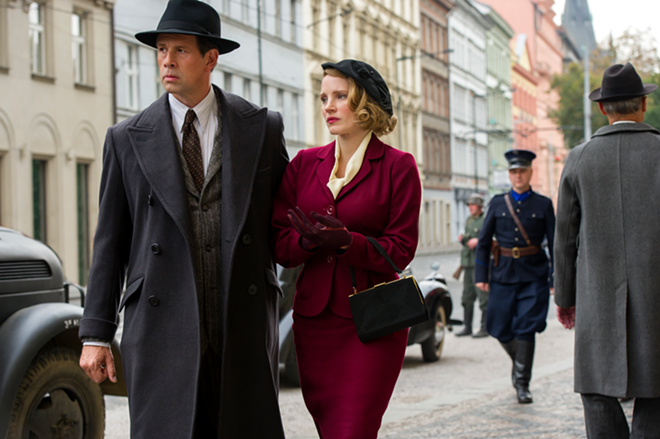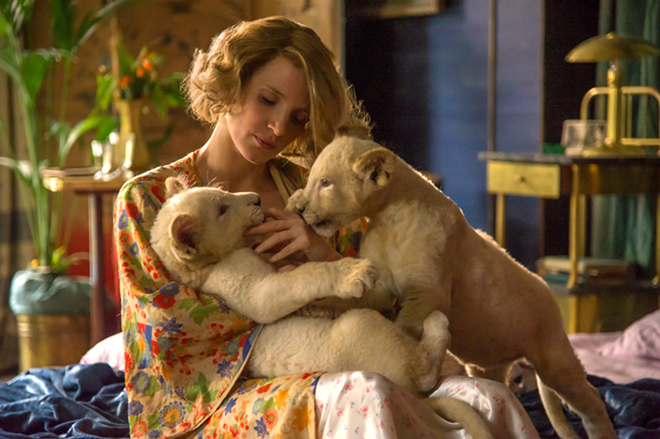No movie can make sense of the Holocaust. All fall short. Even the finest efforts at narrative story telling are inadequate — Life Is Beautiful, The Boy in the Striped Pajamas, The Reader, The Pianist, Inglourious Basterds, Schindler’s List — because a two hour “story” cannot possibly capture the full magnitude of evil at work.
Documentaries, with their historical footage, interviews, cinema verite, have more time to pursue this elusive subject. Consider Marcel Ophuls’ The Sorrow and the Pity at 4 1/2 hours or Claude Lanzmann’s Shoah at 9 1/2 hours. Even this form is ultimately insufficient.
Thus a screenwriter or director who sets out to make a mere two hour feature film about Nazis, ethnic and religious cleansing, German responsibility, and the world’s culpability must by necessity narrow the scope. Tight, tighter, tightest until the focus achieves a limited, precise, minimalist, small story inside the big picture. But we have to wonder whether even Art, no matter how beautiful and true, can possibly make sense or triumph over this Will.
Yet still we try.
So The Zookeeper's Wife finds its limited focus and scope by narrowing in to a simple story of a family and a zoo. This film is based on Diane Ackerman’s mesmerizing 2007 nonfiction account of the Nazis and their march through Poland in 1939, bringing death and destruction in their wake, imprisoning Jews in the Warsaw Ghetto prior to exterminating them and firebombing the city. But there is a zoo in the middle of Warsaw, and when the Nazis plunder it, taking the best specimens to Berlin and shooting the remaining animals, suddenly the zoo is empty.
Jan and Antonina Żabiński, the zookeeper and his wife, tall and blonde and Aryan and Gentile, decide they must resist the Nazis and do what they can to provide rescue and refuge. This resistance is dangerous as the German occupiers vow to execute anyone who collaborates to rescue the Jews, but still they proceed to convert the zoo’s cages, underground tunnels, and the family villa itself into hiding places right under the Nazi noses.
Screenwriter Angela Workman (War Bride) has adapted the Ackerman book for the screen into an heartbreakingly intimate story of this family in Warsaw. Of the over 6 million exterminated in the Holocaust, 380,000 died in the Warsaw ghetto, and the Żabińskis with their zoo manage to rescue a mere 300. Again, to tell the untellable story of this genocidal horror, the focus must now become the story of this small triumph of righteousness. It is the story of a husband and wife who struggle to maintain their own marriage and humanity amidst the horror and carnage around them.
Niki Caro is a director particularly tuned in to bringing out the best in her actresses. She directed Whale Rider (2002) for which Keisha Castle-Hughes was Oscar nominated for Best Actress. She directed North Country (2005) where Charlize Theron was nominated for Best Actress and Frances McDormand for Best Supporting Actress. And now The Zookeeper’s Wife will likely earn Jessica Chastain another Oscar nomination after her Supporting Actress nomination for The Help (2011). She is exquisite.

Chastain has to convey fear, courage, compassion, sophistication, glamor, sexual attraction, revulsion, horror, all in equal measure, and she carries it off with aplomb. She even assists an elephant giving birth. By the way, these are real animals in this film, CGI kept to an absolute minimum.
And Johan Heldenbergh as the Zookeeper himself is equally convincing, solid, masculine, stoic, yet emotionally open as he protects his family, negotiates the transfer of Jews from the ghetto and ultimately becomes a fighter himself. And for the zoo rescue to work, he has to accept that his wife will play along with the chief zoologist of the Berlin Zoo, Lutz Heck, played by Daniel Brühl, who is equally interested in the prime animals and the luscious wife. Based on a real character too, this Berlin zoologist is fascinated with genetics, specifically how best to achieve a super race of animals from the Warsaw Zoo collection, how to use genes to recreate the extinct Auroch, once a powerful bison in German forests, and chillingly, how to use the disposable Jews as lab specimens themselves.
Though ostensibly a war movie with the requisite guns, hair trigger soldiers and ambushing resistance fighters, with women as writer, screenplay adaptor and director, this film is something more intimate, domestic, nurturing, ultimately more about the tenderness than the terror.
The masterful cinematography is by Andrij Parekh who has the camera linger on iron bars, doors, walls, close-ups of wire mesh and padlocks and chains. The cages for the animals become hiding places for the Jews, previously trapped in the ghetto, now caged again in order to be hidden and removed. The tunnels under the villa are like caves. There's even a scene reminiscent of the Lascaux cave paintings where those in hiding assert their humanity by painting the walls with animals, stars, the human hand to convey "I was here." Reinforcing this sense of entrapment are the suffocating interior shots and claustrophobic isolation in the ghetto, the camera starting in tight on the street, then pulling out and craning up to reveal the stunning walled ghetto, a fortified city within a city, a labyrinthine rabbit warren filled with the desperate and the dying, “like rats in a cellar.” To the film’s credit, the camera does not flinch.
The sumptuous Chopin-influenced score is by Harry Gregson-Williams, always supportive, never intrusive, suspenseful, soothing, chilling, featuring pieces by Tchaikovsky, Beethoven, Saint-Saëns, all performed on the piano by Jessica Chastain herself, other pieces by Offenbach and Mozart.
It’s not surprising that the Yad Vashem, Israel’s official memorial to the Jewish victims of the Holocaust, recognizes Jan and Antonina Żabiński as Righteous Among the Nations. And it’s not surprising that this cinematic version of The Zookeeper’s Wife can stand among the best of the Holocaust films, brutally honest, emotionally resonant, one small story among thousands, the human spirit triumphant.
The Zookeeper's Wife
4.5 out of 5 stars
Directed by Niki Caro
Starring Jessica Chastain, Johan Heldenbergh, David Brühl, Michael McElhatton
Opens Mar. 31.


